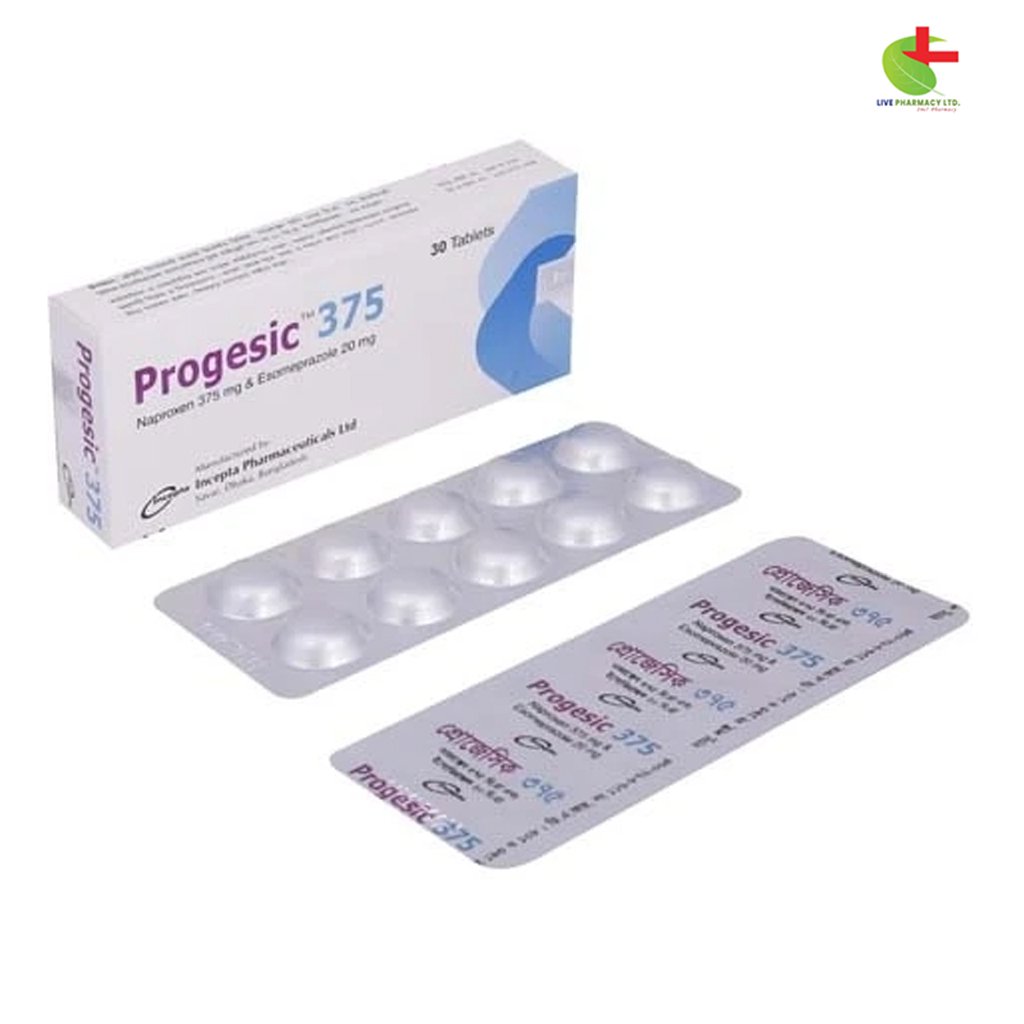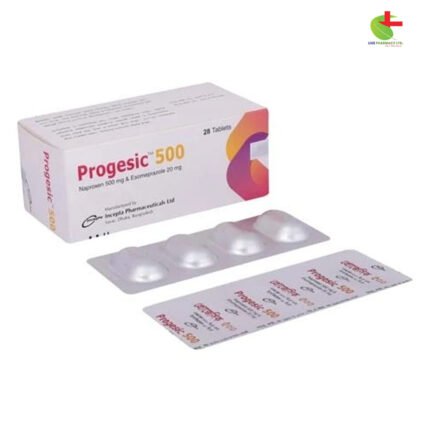Progesic 375
120.00৳ Strip
- Progesic tablets combine Naproxen (NSAID) and Esomeprazole (proton pump inhibitor).
- Indicated for osteoarthritis, rheumatoid arthritis, and ankylosing spondylitis.
- Helps reduce the risk of NSAID-induced gastric ulcers.
- Designed for both adult and adolescent use.
- Consult a healthcare provider before use.
 Brand
Brand
|
Incepta Pharmaceuticals Ltd |
|---|---|
 Generics
Generics
|
Naproxen Sodium + Esomeprazole Magnesium |
 Type
Type
|
Tablet |
Indications
Progesic tablets are designed to alleviate the signs and symptoms associated with:
- Osteoarthritis
- Rheumatoid arthritis
- Ankylosing spondylitis
- Reduction of gastric ulcer risk in patients susceptible to NSAID-related gastric ulcers.
Consult a registered healthcare provider before use.
Pharmacology
This medication features an immediate-release Esomeprazole Magnesium layer combined with an enteric-coated Naproxen core. Esomeprazole is released first in the stomach, followed by the dissolution of Naproxen in the small intestine. Naproxen is a non-steroidal anti-inflammatory drug (NSAID) that provides analgesic and antipyretic effects by inhibiting prostaglandin synthesis. Esomeprazole, a proton pump inhibitor, effectively suppresses gastric acid secretion, thereby lowering gastric acidity.
Dosage
Consider the benefits and risks of Progesic tablets before use. Administer the lowest effective dose for the shortest duration to achieve individual treatment goals.
- Adults with Osteoarthritis, Rheumatoid Arthritis, and Ankylosing Spondylitis: One tablet twice daily (375 mg Naproxen/20 mg Esomeprazole or 500 mg Naproxen/20 mg Esomeprazole).
- Juvenile Idiopathic Arthritis (Ages 12 and up):
-
50 kg: 375 mg Naproxen/20 mg Esomeprazole or 500 mg Naproxen/20 mg Esomeprazole.
- 38-50 kg: One tablet twice daily (375 mg Naproxen/20 mg Esomeprazole).
-
Consult a registered healthcare provider before use.
Administration
Do not split, chew, crush, or dissolve the tablet. Take at least 30 minutes before meals.
Consult a registered healthcare provider before use.
Interaction
- Co-administration with NSAIDs may lessen the antihypertensive effects of ACE inhibitors, diuretics, and beta-blockers.
- Potential increased bleeding risk when taken with warfarin.
- Esomeprazole may interfere with the absorption of certain medications requiring specific gastric pH.
Contraindications
- Known hypersensitivity to any component or substituted benzimidazoles.
- History of asthma, urticaria, or allergic reactions following NSAID use.
- Use during the peri-operative phase of coronary artery bypass graft (CABG) surgery.
Side Effects
Esomeprazole inclusion helps reduce gastrointestinal side effects from Naproxen. Risks include gastrointestinal bleeding, peptic ulcers, and other GI events. Common side effects include nausea, vomiting, and abdominal pain.
Pregnancy & Lactation
- Pregnancy: Should not be administered during the third trimester. Use only if benefits outweigh risks in earlier trimesters.
- Breastfeeding: Not recommended due to potential low excretion of Naproxen in human milk.
Precautions & Warnings
Monitor for gastrointestinal complications, particularly in older adults. The risk of cardiovascular and renal side effects should be assessed prior to treatment.
Use in Special Populations
Exercise caution with elderly patients, those with renal or hepatic impairment, and those requiring long-term treatment.
Overdose Effects
Overdose symptoms can include dizziness, abdominal pain, and gastrointestinal bleeding. Management involves supportive care, as there are no specific antidotes.
Therapeutic Class
This medication falls under drugs for osteoarthritis, rheumatoid arthritis, and NSAIDs.
Storage Conditions
Store below 30°C, protected from light and moisture. Keep out of reach of children.













Reviews
There are no reviews yet.